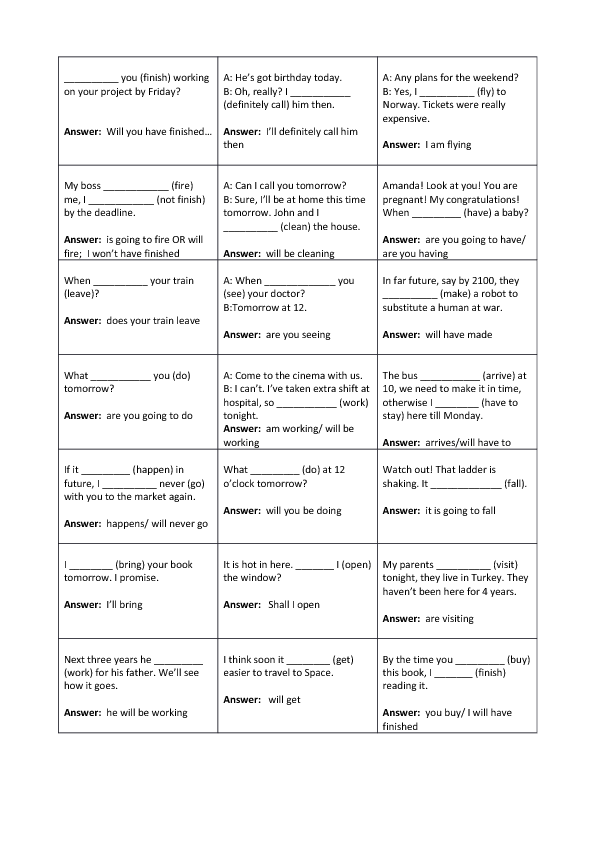Grammar Games Future Tense
TESOL blogger Lena Shvidko shares four games that you can use in your classes to practice verb tenses and make your lesson more fun. Grammar games for kids to practice verb tenses, spelling, reading, writing, conversation, and grammar in use. All of the games have sound, so you can listen and check your understanding, practice conversation, or just listen and repeat.
Today I’ll share four games that you can implement in your classes to practice verb tenses and make your lesson more fun. Grid on the Board For this activity you need to prepare two sets of sentences with different verb tenses. Each set has a different color. The sets are on the desk in front of the room. Draw the following grid on the board: Present Past Future Simple Progressive Perfect Divide students into two teams.

Autocad Leader Break Size. Valentina Lisitsa Rapidshare S. One person from each team will go to the desk and pick a sentence (each team has its own color). The team needs to decide where in the grid they will place the sentence.
Word grammar; Sentence grammar. T Tips for tutors; Past, present or future tense Logging tenses game. Logging tenses game. Try more games.
Then someone from the team goes to the board and places the sentence in the chosen slot. The team wins if they place all of their cards first and correctly. Swap Chairs You can use this game to practice either all tenses or only one (e.g., present perfect). All students are sitting in a circle and one student (i.e., the Speaker) is standing in the middle. The speaker says, “Swap chairs if you have ever ridden a horse.” The students who have ridden a horse must get up and switch chairs. If no one gets up, the Speaker makes another sentence. If only one student gets up, they switch with the Speaker.
If you are practicing all tenses in this game, then the sentences can be in any tense, for example, “Swap chairs if you will watch TV tonight,” “Swap chairs if you are wearing jeans,” “Swap chairs if you like to hike.” Truth or Lie (Present Perfect Tense) By doing this activity, student not only practice grammar, but they also learn a lot of interesting things about their classmates. To prepare for this activity, you will need dice (one die per team), and a list of questions in present perfect (e.g., “Have you ever been to Australia?” “Have you ever ridden an elephant?”). Write one question on a separate piece of paper. Each team will receive a set of the papers with the questions written on them. Alternatively, you may give students some time at the beginning of the activity for each of them to create a few questions for their classmates. Divide students into teams.
Keep teams relatively small if possible (approximately 3-5 students per team). If you have a small number of students, you can certainly do this activity as a whole class. To start the activity, one person in a team is chosen to answer a question. Someone else in the team picks a question and reads it to the Answerer. The Answerer then secretly rolls the die, so the other members of the team can’t see it. If the number is odd, then the answer to the question should be truthful; if the number is even, the student should make up a lie.
The other members of the team then ask follow-up questions, which can be in any tense until they figure out whether the answer was the truth or the lie. Each person in the team needs to ask at least one question until the “verdict” is given. Tarot Cards (Future Tense) Make simple tarot cards. For example, you can draw simple pictures or symbols representing • Family • Travel • Love • Home • Children • Happiness • Wealth • Work • Education • Power • Entertainment, etc. The number of the card sets should correspond with the number of pairs of students in your class.
Divide students into pairs and give each pair a set of the cards. Ask students to draw cards and tell each other their fortunes. To make the activity more challenging and interesting, a Fortuneteller needs to include at least 3 sentences in each fortune. Please feel free to share activities that you implement in your classes to help students practice verb tenses. Elena Shvidko is an assistant professor at Utah State University.
She received her doctorate in second language studies from Purdue University and her master’s degree in TESOL from Brigham Young University. Her work appears in TESOL Journal, System, Journal on Response to Writing, TESOL interest section newsletters, and TESOL's New Ways series.